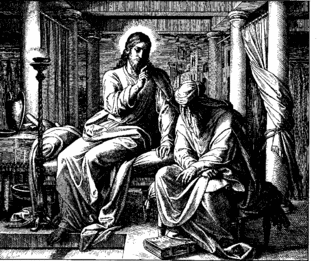In both of today’s
readings, people try to “negotiate” with God.
In the first reading (
Gen. 18:16-33), Abraham appears to haggle with the Lord over the minimum number of righteous people required to save the notoriously wicked Sodom and Gomorrah from the wrath of God. The Lord responds by accepting each of Abraham’s proposals.
In the Gospel (
Mt. 8:18-22), a man tries to delay following Christ for what sounds like a good reason (burying his father). The Lord responds by rebuking the man.
Why was one man’s “negotiation” with God accepted and the other’s not?
The answer to this question is important because when we pray,
we may sometimes appear to be "negotiating" with God.
The answer is
not that God simply plays favorites.
Compare Abraham’s “negotiation” in the first reading with Peter’s remonstrations in Matthew 16:
Both men are identified as "favorites" - indeed, both have just been singled out by the Lord himself as special, universal instruments of God’s saving power.
Abraham shall surely become a great and mighty nation,
and all the nations of the earth shall be blessed in himBlessed art thou, Simon Barjona:
for flesh and blood hath not revealed it unto thee,
but my Father which is in heaven.
And I say also unto thee,
That thou art Peter,
and upon this rock I will build my church;
and the gates of hell shall not prevail against it.
And I will give unto thee
the keys of the kingdom of heaven:
and whatsoever thou shalt bind on earth
shall be bound in heaven:
and whatsoever thou shalt loose on earth
shall be loosed in heaven.
But then, when Peter tries to reason with Christ about suffering and dying in Jerusalem, our Lord rebukes him in the strongest fashion
Get thee behind me, Satan:
thou art an offence unto me:
for thou savourest not the things that be of God,
but those that be of men.In this rebuke, our Lord gives us the answer to the question - the difference between
successful and
unsuccessful “negotiation” with God: humble fidelity to God’s will.
First, note that when Abraham speaks with God, he is abjectly humble (“
See how I am presuming to speak to my Lord, though I am but dust and ashes!”) in contrast to the attitude of Peter and the man in today’s Gospel.
Second, note that what Abraham says does not contradict the Lord’s explicit words (which spoke of investigation rather than destruction) and that his argument is based on
God’s own attributes (“
Should not the judge of all the world act with justice?”).
Peter and the man in today’s Gospel, on the other hand, try to adapt the Lord’s call and his words to a
human agenda.
A cynic might conclude therefore that the only successful negotiation with God is to agree with God (to which the undiplomatic believer might reply, “
Duh!”).
Ultimately, of course, no one can win a disagreement with God - God is omnipotent and omniscient – but we also know that
God is love.
As human beings in a complex world, we may have our own feelings about how things should be, and we should be honest with God about our feelings, but we also know that it is
God’s way that ultimately brings the greatest good and the greatest happiness.
Honesty in prayer is indeed critical: opening ourselves
completely to the Lord, so that by his grace we may be purified and may discern what is godly and what is not. (Too often, like the man in the Gospel, we fool ourselves with specious excuses.)
Just as the Lord invited Abraham to speak with him, so too God invites
us to speak with him in prayer: not so that
he may do as
we want, but so that
we may be more and more like
him.
Abraham’s “negotiation”
with God was ultimately a manifestation of the mercy and justice
of God and an example to all of us.
But the most perfect example of prayer (and divine-human negotiations) comes from our Lord and Savior Jesus Christ himself:
And he went a little further, and fell on his face, and prayed, saying,
O my Father, if it be possible,
let this cup pass from me:
nevertheless not as I will,
but as thou wilt.Matthew 26:39
That is the perfect example of prayer:
complete humility,
absolute honesty,
and
total fidelity.
Let us pray.
 A Penitent Blogger
A Penitent Blogger































